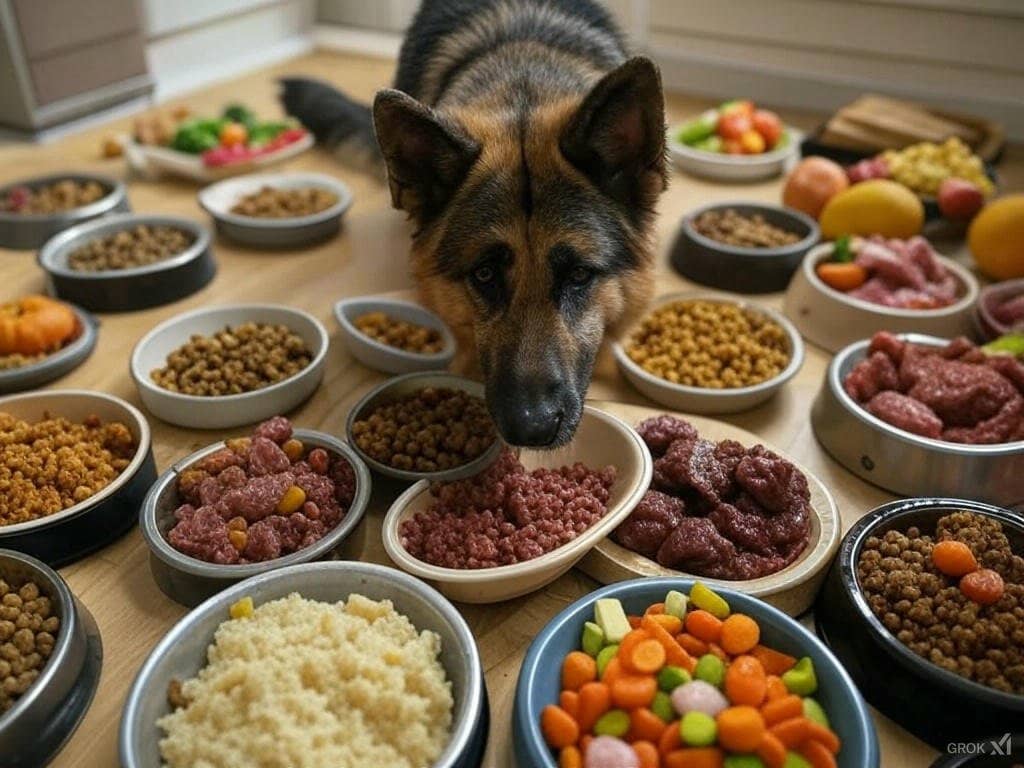Nutrition Essentials for Dogs and Common Feeding Mistakes by Pet Parents

Introduction
Choosing the right diet for your dog can be pivotal to their health, happiness, and longevity. Just like humans, dogs require a balanced diet to thrive, but with so many options on the market, it’s easy to make mistakes. This article will explore the best food choices for dogs, and highlight common errors dog parents make when feeding their pets.
Nutritional Needs of Dogs
Proteins:
- Why it’s important: Essential for muscle growth, repair, and overall bodily functions.
- Best sources: High-quality animal proteins like chicken, beef, lamb, or fish.
Fats:
- Why it’s important: Provides energy, supports skin and coat health, and aids in vitamin absorption.
- Best sources: Fish oil for omega-3 fatty acids, flaxseed, or chicken fat.
Carbohydrates:
- Why it’s important: Supply energy, fiber for digestion, and support gut health.
- Best sources: Whole grains like brown rice or barley, or vegetables like sweet potatoes.
Vitamins and Minerals:
- Why it’s important: Vital for bone health, immune system, and metabolic functions.
- Best sources: Often provided through a balanced commercial dog food, but can be supplemented with fresh fruits and vegetables.
Water:
- Why it’s important: Essential for all bodily functions; dehydration can lead to severe health issues.
Best Food Choices for Dogs
1. High-Quality Commercial Dog Foods
- Dry Kibble: Convenient, cost-effective, and helps maintain dental health by reducing plaque. Look for foods with whole meats listed as the first ingredients and avoid those with many artificial additives. Don’t even consider foods that mention ‘meals’ like chicken meal, beef meal, fish meal, etc. Those are allowed to come from diseased and dead animals.
- Wet Food: Higher moisture content which is good for hydration, especially for dogs that don’t drink enough water. Ideal for dogs with dental issues or those who need more palatable food.
- Grain-Free Options: For dogs with grain sensitivities, but ensure they’re not missing out on essential nutrients grains provide.
2. Raw Diets
- Benefits: Can be highly nutritious if balanced correctly, supporting a natural diet with enzymes and less processed nutrients.
- Risks: Potential for bacterial contamination, nutritional imbalances if not carefully planned. Veterinary advice is critical.
3. Homemade Foods
- Benefits: Control over ingredients, potentially avoiding allergens or additives.
- Challenges: Requires a solid understanding of canine nutrition to ensure all nutritional bases are covered. To remove these obstacles, consult a naturopathic vet or nutritionist.
4. Fresh Dog Food Services
- Benefits: Delivered to your door, often made with human-grade ingredients, tailored to your dog’s specific needs.
- Cost: Generally more expensive than store-bought options.
Common Feeding Mistakes
1. Overfeeding
- Issue: Leads to obesity, which can cause numerous health problems like diabetes, joint issues, and heart disease.
- Solution: Follow feeding guidelines on food packages, adjust for your dog’s activity level, and consult with a vet.
2. Underfeeding
- Issue: Can lead to malnutrition, weight loss, and weakened immune systems.
- Solution: Ensure portions are adequate, especially for active or growing dogs.
3. Inconsistent Diet
- Issue: Switching foods too often can upset a dog’s digestive system.
- Solution: Introduce new foods gradually over a week or more to allow the gut to adjust.
4. Ignoring Dietary Needs
- Issue: Not all dogs have the same dietary requirements; for example, breed, age, and health conditions matter.
- Solution: Tailor food to life stages (puppy, adult, senior) and specific health needs (like allergies or weight management). If your dog has a health challenge, consult your vet.
5. Giving Human Food
- Issue: Many human foods are toxic to dogs or nutritionally unbalanced.
- Solution: Limit human food to safe, beneficial treats like plain cooked chicken or carrots, and avoid toxic foods like chocolate or grapes. Make sure you do your research, and consult your vet or dog nutritionist, as there is a very long list of foods and spices that are highly toxic to dogs, and a much shorter list of foods and spices that are healthy for dogs.
6. Neglecting Dental Health
- Issue: Wet food can leave residue, and no dental chewing can lead to dental disease.
- Solution: Incorporate dental chews, hard kibble, or consider dental care products.
Conclusion
Feeding your dog the right diet is not just about avoiding mistakes; it’s about actively promoting health through informed choices. Always consult with a veterinarian before making significant changes to your dog’s diet, especially if you’re considering a raw or homemade diet. Remember, what works for one dog might not suit another, so personalization is key. Keep learning, stay observant of your dog’s health and behavior, and you’ll help ensure they live a long, healthy life.
Leave a Reply
You must be logged in to post a comment.
Leave a Comment